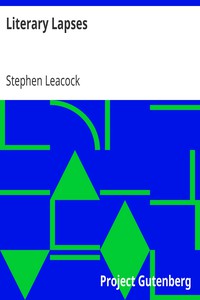Literary Lapses by Stephen Leacock (ebook reader online TXT) 📗

- Author: Stephen Leacock
Book online «Literary Lapses by Stephen Leacock (ebook reader online TXT) 📗». Author Stephen Leacock
At this moment the final crash came.
Something hit something. There was an awful click followed by a peculiar grating sound, and in less time than it takes to write it (unfortunately), the whole wreck was over.
As the vessel sank, Longfellow's senses left him. When he reopened his eyes he was in his own bed at home, and the editor of his local paper was bending over him.
"You have made a first-rate poem of it, Mr. Longfellow," he was saying, unbending somewhat as he spoke, "and I am very happy to give you our cheque for a dollar and a quarter for it."
"Your kindness checks my utterance," murmured Henry feebly, very feebly.
A, B, and C THE HUMAN ELEMENT IN MATHEMATICS
The student of arithmetic who has mastered the first four rules of his art, and successfully striven with money sums and fractions, finds himself confronted by an unbroken expanse of questions known as problems. These are short stories of adventure and industry with the end omitted, and though betraying a strong family resemblance, are not without a certain element of romance.
The characters in the plot of a problem are three people called A, B, and C. The form of the question is generally of this sort:
"A, B, and C do a certain piece of work. A can do as much work in one hour as B in two, or C in four. Find how long they work at it."
Or thus:
"A, B, and C are employed to dig a ditch. A can dig as much in one hour as B can dig in two, and B can dig twice as fast as C. Find how long, etc. etc."
Or after this wise:
"A lays a wager that he can walk faster than B or C. A can walk half as fast again as B, and C is only an indifferent walker. Find how far, and so forth."
The occupations of A, B, and C are many and varied. In the older arithmetics they contented themselves with doing "a certain piece of work." This statement of the case however, was found too sly and mysterious, or possibly lacking in romantic charm. It became the fashion to define the job more clearly and to set them at walking matches, ditch-digging, regattas, and piling cord wood. At times, they became commercial and entered into partnership, having with their old mystery a "certain" capital. Above all they revel in motion. When they tire of walking-matches—A rides on horseback, or borrows a bicycle and competes with his weaker-minded associates on foot. Now they race on locomotives; now they row; or again they become historical and engage stage-coaches; or at times they are aquatic and swim. If their occupation is actual work they prefer to pump water into cisterns, two of which leak through holes in the bottom and one of which is water-tight. A, of course, has the good one; he also takes the bicycle, and the best locomotive, and the right of swimming with the current. Whatever they do they put money on it, being all three sports. A always wins.
In the early chapters of the arithmetic, their identity is concealed under the names John, William, and Henry, and they wrangle over the division of marbles. In algebra they are often called X, Y, Z. But these are only their Christian names, and they are really the same people.
Now to one who has followed the history of these men through countless pages of problems, watched them in their leisure hours dallying with cord wood, and seen their panting sides heave in the full frenzy of filling a cistern with a leak in it, they become something more than mere symbols. They appear as creatures of flesh and blood, living men with their own passions, ambitions, and aspirations like the rest of us. Let us view them in turn. A is a full-blooded blustering fellow, of energetic temperament, hot-headed and strong-willed. It is he who proposes everything, challenges B to work, makes the bets, and bends the others to his will. He is a man of great physical strength and phenomenal endurance. He has been known to walk forty-eight hours at a stretch, and to pump ninety-six. His life is arduous and full of peril. A mistake in the working of a sum may keep him digging a fortnight without sleep. A repeating decimal in the answer might kill him.
B is a quiet, easy-going fellow, afraid of A and bullied by him, but very gentle and brotherly to little C, the weakling. He is quite in A's power, having lost all his money in bets.
Poor C is an undersized, frail man, with a plaintive face. Constant walking, digging, and pumping has broken his health and ruined his nervous system. His joyless life has driven him to drink and smoke more than is good for him, and his hand often shakes as he digs ditches. He has not the strength to work as the others can, in fact, as Hamlin Smith has said, "A can do more work in one hour than C in four."
The first time that ever I saw these men was one evening after a regatta. They had all been rowing in it, and it had transpired that A could row as much in one hour as B in two, or C in four. B and C had come in dead fagged and C was coughing badly. "Never mind, old fellow," I heard B say, "I'll fix you up on the sofa and get you some hot tea." Just then A came blustering in and shouted, "I say, you fellows, Hamlin Smith has shown me three cisterns in his garden and he says we can pump them until to-morrow night. I bet I can beat you both. Come on. You can pump in your rowing things, you know. Your cistern leaks a little, I think, C." I heard B growl that it was a dirty shame and that C was used up now, but they went, and presently I could tell from the sound of the water that A was pumping four times as fast as C.
For years after that I used to see them constantly about town and always busy. I never heard of any of them eating or sleeping. Then owing to a long absence from home, I lost sight of them. On my return I was surprised to no longer find A, B, and C at their accustomed tasks; on inquiry I heard that work in this line was now done by N, M, and O, and that some people were employing for algebraica jobs four foreigners called Alpha, Beta, Gamma, and Delta.
Now it chanced one day that I stumbled upon old D, in the little garden in front of his cottage, hoeing in the sun. D is an aged labouring man who used occasionally to be called in to help A, B, and C. "Did I know 'em, sir?" he answered, "why, I knowed 'em ever since they was little fellows in brackets. Master A, he were a fine lad, sir, though I always said, give me Master B for kind-heartedness-like. Many's the job as we've been on together, sir, though I never did no racing nor aught of that, but just the plain labour,





Comments (0)